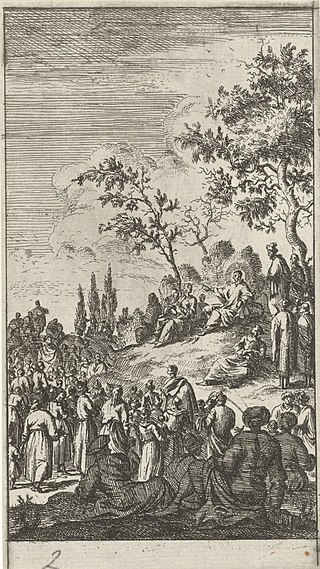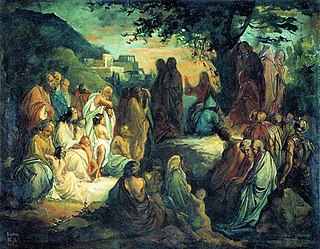
Mark 12 is the twelfth chapter of the Gospel of Mark in the New Testament of the Christian Bible. It continues Jesus' teaching in the Temple in Jerusalem, and contains the parable of the Wicked Husbandmen, Jesus' argument with the Pharisees and Herodians over paying taxes to Caesar, and the debate with the Sadducees about the nature of people who will be resurrected at the end of time. It also contains Jesus' greatest commandment, his discussion of the messiah's relationship to King David, condemnation of the teachers of the law, and his praise of a poor widow's offering.

Matthew 3:2 is the second verse of the third chapter of the Gospel of Matthew in the New Testament. John the Baptist has been introduced in the first verse and this verse describes the message that he is preaching. Through John's message, Matthew introduces the "Kingdom of Heaven".

Matthew 3 is the third chapter of the Gospel of Matthew in the New Testament. It is the first chapter dealing with the ministry of Jesus, with events taking place some three decades after the close of the infancy narrative related in the previous two chapters. The focus of this chapter is on the preaching of John the Baptist and the Baptism of Jesus.

Matthew 3:7 is the seventh verse of the third chapter of the Gospel of Matthew in the New Testament. The verse occurs in the section introducing John the Baptist. In this verse John attacks the Pharisees and Sadducees.

Matthew 3:9 is the ninth verse of the third chapter of the Gospel of Matthew in the New Testament. The verse describes an incident where John the Baptist berates the Pharisees and Sadducees. He has previously called them a brood of vipers and warned them of the wrath to come and has urged them to repent. In this verse he warns that their links to Abraham will not save them.

Matthew 3:10 is the tenth verse of the third chapter of the Gospel of Matthew in the New Testament. The verse occurs in where John the Baptist is berating the Pharisees and Sadducees. He has previously called them a brood of vipers and warned them of the wrath to come and has urged them to repent. This verse returns to the fruit metaphor of Matthew 3:8 adding a promise of eventual punishment.

Matthew 3:11 is the eleventh verse of the third chapter of the Gospel of Matthew in the New Testament. The verse occurs in the section relating the preachings of John the Baptist. In this verse he predicts that he will be followed by someone much greater than himself. The main theme of this verse is that John will soon be supplanted by a much greater figure and that John's water baptism is just a preparation for the much greater baptism with the Holy Spirit and fire that will occur under the second coming of the Christian messiah Jesus, an original Christian concept that, according to Jewish scholars, lacks any fundament in the Hebrew scripture.

Matthew 4:3 is the third verse of the fourth chapter of the Gospel of Matthew in the New Testament. This verse opens the section in Matthew dealing with the temptation of Christ by Satan. Jesus has been fasting for forty days and forty nights, and in this verse the devil gives Christ his first temptation by encouraging him to use his powers to get food.

John 3 is the third chapter of the Gospel of John in the New Testament of the Christian Bible. It deals with Jesus' conversation with Nicodemus, one of the Jewish pharisees, and John the Baptist's continued testimony regarding Jesus. Baptist preacher Charles Spurgeon said of this chapter that it is the chapter he would choose "to read to a dying man who did not know the gospel, [as] the most suitable one for such an occasion".

Matthew 7:16 is the sixteenth verse of the seventh chapter of the Gospel of Matthew in the New Testament and is part of the Sermon on the Mount. This verse continues the section warning against false prophets.

Matthew 23 is the twenty-third chapter in the Gospel of Matthew in the New Testament section of the Christian Bible, and consists almost entirely of the accusations of Jesus against the Pharisees. The chapter is also known as the Woes of the Pharisees or the "Seven Woes". In this chapter, Jesus accuses the Pharisees of hypocrisy. Some writers treat it as part of the final discourse of Matthew's gospel.

Matthew 9 is the ninth chapter of the Gospel of Matthew in the New Testament and continues the narrative about Jesus' ministry in Galilee as he ministers to the public, working miracles, and going through all the cities and towns of the area, preaching the gospel, and healing every disease. This chapter opens with Jesus back in "his own town", i.e. Capernaum.
Matthew 16 is the sixteenth chapter in the Gospel of Matthew in the New Testament section of the Christian Bible. Jesus begins a journey to Jerusalem from the vicinity of Caesarea Philippi, near the southwestern base of Mount Hermon. Verse 24 speaks of his disciples "following him".

Matthew 22 is the twenty-second chapter in the Gospel of Matthew in the New Testament section of the Christian Bible. Jesus continues his final ministry in Jerusalem before his Passion. Teaching in the Temple, Jesus enters into debate successively with the Pharisees, allied with the Herodians, the Sadducees, and a lawyer, ultimately silencing them all.
Luke 20 is the twentieth chapter of the Gospel of Luke in the New Testament of the Christian Bible. It records the teaching of Jesus Christ in the temple in Jerusalem, especially his responses to questions raised by the Pharisees and Sadducees. The book containing this chapter is anonymous, but early Christian tradition uniformly affirmed that Luke the Evangelist composed this Gospel as well as the Acts of the Apostles.

The parable of the barren fig tree is a parable of Jesus which appears in Luke 13:6–9. It is about a fig tree which does not produce fruit.

Matthew 7:19 and Matthew 7:20 are the nineteenth and twentieth verses of the seventh chapter of the Gospel of Matthew in the New Testament and are part of the Sermon on the Mount. The verses continue the section warning against false prophets.

Matthew 7:23 is the twenty-third verse of the seventh chapter of the Gospel of Matthew in the New Testament and is part of the Sermon on the Mount. This verse continues Jesus' warning against false prophets.
Matthew 11:12 is the twelfth verse in the eleventh chapter of the Gospel of Matthew in the New Testament.
Matthew 12:33 is the 33rd verse in the twelfth chapter of the Gospel of Matthew in the New Testament.
















